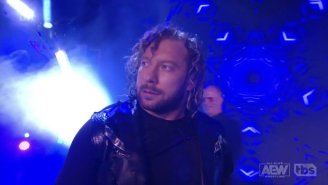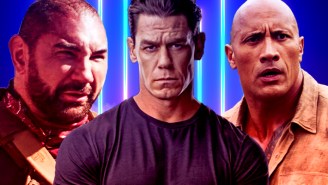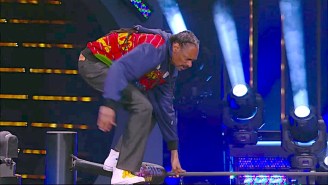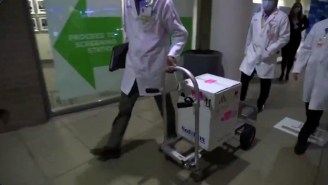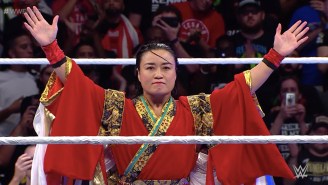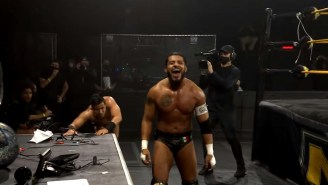Thaddeus Bullard is better known to the world at large as Titus O’Neil, the long-tenured WWE Superstar. Previously one-half of the Prime Time Players, the former tag team champion has spent the better part of the past year developing the Titus Brand, which has now morphed into Titus Worldwide, with Apollo Crews and Akira Tozawa serving as his charges.
But the best stuff that Bullard has been doing has been outside the ring. We’ve known for years that he puts a lot of his free time and passion into charity work and giving back to the community, and he’s worn his heart on his sleeve about a number of worthwhile causes. We recently had a chance to talk to Bullard about some issues that loom larger than pro wrestling, and what ventures he’s leaping into next, beyond the squared circle.
This is just a portion of what we spoke to Bullard about. For the entire interview, you can listen to Episode 4 of the With Spandex podcast.
UPROXX: Do you feel like you’re adjusting well to sort of adjusting to sort of a managerial role in WWE with Titus Worldwide? You were an active in-ring competitor for so long; has it taken a little bit to get used to, or do you get to play with your personality a little bit more now?
Thaddeus Bullard: No, I mean I’m not, I don’t even know about you considering me as a manager. You know, I’m more like trying to just lead a stable, because eventually I am going to return to the ring in the right situation. But right now, I’m having a lot of fun helping other people have a lot of fun. I feel like Apollo has definitely benefited from the aspect of being able to show more of his personality, as well as Tozawa, and they both have tremendous in-ring talent. It’s just a matter of helping show their personalities more, because as you know, everybody knows in entertainment characters sell. You can be the best wrestler in the world, the best singer in the world, but if you can’t perform and have personality and character to you as an individual, then a lot of times there’s just a disconnect.
So you’ve built Titus Worldwide as a brand, and now you’re building Thaddeus Bullard as a brand. What advice can you give people who are trying to get out there and do their own thing and make their own way in the world?
First and foremost, be respectful. Be respectful to yourself first and foremost, and then be respectful to everybody you come in contact with. Because there’s an old saying that … the people that you see on the way up are also the same people that you’re going to see on the way down. I’m big on relationships, and building relationships, and maintaining them. I have tremendous relationships literally worldwide, which is the reason why this new character that I’m doing inside of WWE is just so fitting for me, because I legitimately can pick up my telephone and get access to anything I need, to anyone I need to. I think that has a lot to do with character, and I feel like if people push character and having good character more than they did race or religion or financial situation, or education level — I think if they just push character more than they push those other aspects of what it takes to be a good human being, and a successful one, I think a lot more people would be on their way to discovering new success based on simply being a good person.
While we’re talking about being a good person: you’ve taken homeless people out to dinner, you’ve done a lot of charity work. We saw your TED Talk, and the last time we spoke to you, you were also doing charity work. Is that what drives you; giving back to the community?
What drives me is giving people an opportunity to be better off after they meet me than they were before they meet me. The reason that I feel so strong about doing that is because my story is one in itself, and my mom, like I said in the TED Talk, was my first domino. If people hadn’t invested in me when they had nothing to gain in return, I could not have achieved any level of success, whether it had been in high school, college, or professionally. I feel like I want to be that domino, that one person that walks by somebody and says hello when everybody else just looks past them; or that person that says yes when everybody else has told them no; or one person who encourages somebody and say “Yes you can” when everybody else is telling them what they can’t do.
A lot of my community efforts are not based on one sole cause. If you follow me, you know I believe in education. I believe in trying to find a cure for cancer, whether it be pediatric or breast cancer or prostate, because I’ve lost family members and friends to it. I believe in trying to get people that are within the justice system placed in the right light; that’s why I do a lot of stuff with law enforcement, because law enforcement helped save my life. There’s not really one aspect of what I do, from the standpoint of humanitarian efforts, you could say, “You know that guy, that’s what he does.” People call me all the time and try to do things. I’m only one person, but if I can motivate five people to go out and try to save somebody’s life, then that five multiplies, and then so on and so forth. I feel like I’ve done my job of trying to make this world a better place.
I know, speaking of the world being a better place, our country’s kind of in a tough spot right now. We’re very divided. Do you have any thoughts on that, or sort of how we could come together as a country without necessarily ignoring a lot of the things going on?
You said a key word there, ignoring, and that’s based on people’s ignorance. People are ignorant to … Racial issues are not anything new in this country. Until we accept that, until some people accept that and understand that, there’s no way that you can really get upset about what’s going on around us. There needs to be some very open dialog, but there also needs to be some very open actions.
A lot of people … I had a guy that served like as a mentor to me, he was an African-American man that was running for superintendent of schools in a predominantly white place, and they told him, there were so many people that wanted to donate to him that said, “I’ll donate to your campaign, but please don’t tell anybody where it came from.” And he said, “I don’t want your money, because if you can’t openly support me, then that means you’re not open to change. So when things go downhill, you’ll still be hidden. I want people that will be out on the forefront to help me get people in a better place, get people more educated, and get people in a place where we’re changing things generationally.”
That’s what I’m looking to do. I’m looking to change things generationally, so when I go, and I have a program that’s set up to help kids that perform at a low level academically and struggle with getting to school and their attendance. If I can take several of those kids and give an understanding of the importance of why they need to come to school, and then when come to school why it’s important for them to try to apply themselves while they’re at school, then I have a chance to take a kid that was once labeled a failure and put them in a position that they can be a first-generation high school graduate, a first-generation college graduate, a first-generation master’s student, doctor, lawyer, whatever it may be. That doesn’t matter what color somebody is. We all have had help at some point, and I think it’s our responsibility to not only thing think, not only just issues of race, but issues of just human life period.
Face the truth of it, and face the reality of it. Everybody wants to hurry up, go and help this country and help that country, and help this city and help that city, when they’re not even doing anything locally to help their own city. I just don’t understand that. We’re looking at the government and saying, “You guys need to do something.” Then they’re looking at their religious sectors and saying, “Oh, you guys need to do something.” No, we need to do something, the people, because the organizations and the formats that have been set up to help people the most, the government and religious places, have failed. They’ve failed to connect theirselves to bring people together.
The only way that we’ll do that is to have people with like minds, regardless of religion, race, culture, creed, like minds that want to make this place a better place stand up, protest, and I’m not much of a protest guy. I feel like I can take that same energy that I would do standing out in a line four or five hours, not knocking anybody that does it. I can take the same four or five hours and go into a local school and tutor some kids that are struggling with their reading, or go and feeding the homeless, or trying to fund raise to have an event so that we can help make some change. I just, that’s the way I protest. I protest by just going out and trying to continuously work tirelessly to help people get into a better situation than they’re in.
Do you think that understanding of race has gotten any better in pro wrestling recently? I know we have African-American characters like the New Day, who often talk about how nice it is that they can just kinda be themselves on TV. And then at the same time, you have characters like Jinder Mahal, who are still sort of fueled by this, “The crowd doesn’t understand me and they hate me because of who I am,” and then the crowd has such a negative reaction to that. Do you think that race will ever be an understood thing in pro wrestling, or do you think that it plays too strongly on stereotype, just based on what it is?
I think entertainment as a whole plays strongly on — too strongly on stereotypes in some cases, not just in professional wrestling. You have stereotypical characters that play stereotypical roles in television shows, and I’m very happy to see that there are more people that are very creative, that have gone outside of the box and played characters that have nothing to do with “stereotypical” culture that they come from, or their background. There are directors out there, and producers out there, that are now putting better content, better movies, better TV characters. The world is changing, so we all have to change with that world. Again, if it’s in the fabric of the country, then why wouldn’t it be portrayed on film any differently?
I think it’s gotten better; there have definitely been more opportunities for minorities in film, both behind the camera and on screen. But at the end of the day, there has to be, I think in order for certain things to have a genuine feel to it, it has to be some stereotypical aspects to it in order for people to kinda connect the dots, because that’s what they’re accustomed to seeing. So when you see different characters that are outside of what people are normally seeing, then it’s like, “Oh wow, that was really amazing.”
But let’s not lose track of the fact that there’s been at least four or five movies that have come out over the past two years that accurately portray, or told stories that were untold, like Selma, or Hidden Figures, or even recently here, Detroit or The Birth of a Nation. There are so many movies out there that show the depictions of, and that’s only captured in two hours, that’s only what they tell. They can only tell so much in a two- or three-hour period.
I do think in professional wrestling that we’ve done a lot better with portraying characters and letting people be kind of more of themselves. Again, I think that it’s just like any other entertainment aspect, there will always be some type of stereotypical role or character played. just because that’s in the fabric of entertainment, it’s in the fabric of our culture.
So what’s next for Thaddeus Bullard? What are you working on?
People ask me that question all the time. I definitely want to get into Hollywood and do some acting, hopefully do some television or movie work, theater work. I have plenty of connections in the world of sports and entertainment, so I may dabble in some coaching or consulting, or I definitely, now that I’ve done this TED Talk, I’ve opened up a whole new arena for me to venture out into the public speaking realm. I’ll be doing a lot of that in the up coming weeks. I was just with Temple University football a couple of weeks ago.
So I’ve kind of spread my wings a lot, and I’m trying to continue to grow my foundation and bring some legacy so that we can continue to impact people’s lives and change things generationally for the better for these kids that are outstanding kids. I’ve helped 297 kids go to college in the last eight years, over $20 million in scholarships. We had six kids play for a national championship this year.
It’s pretty cool when you see a kid who’s eleven years old, ten years old, and the next thing you know you’re going to Temple University and you send Ventell Bryant, who’s their starting wide receiver that you coached when he was a pup. Or you go to Clemson University, and you see a guy like Ray-Ray McCloud that you coached and that you mentored. You go all over the country and you got kids that played there, or are playing. And not only are they playing football, but they’re continuing to be great citizens, they’re great students, and they’re on pace to graduate, if they haven’t graduated already.
Those are the things that I feel like make lasting impressions, and that’s the thing that drives me is being able to do things that are not just symptomatic but life-changing. A lot of time, we don’t have a problem in this country with raising money; we have billions of dollars that are raised yearly for charities of all kinds of ailments, or injuries, or whatever it may be, causes. Our problem is that we work on symptoms instead of actually getting to the root cause, and then once you get to the root cause then you can go ahead and eradicate the cause instead of working on the symptoms.
That’s what I’m trying to get people to grasp ahold of and not just continue to pour money blindly into different things. When I’ll ask people for contribution, I ask them for commitment, because if you ask them … I can ask somebody for a check for, to write a check for $100,000 and make a contribution to something, and they will do it and not even bat an eye. But if I say I want you to pledge and commit to doing $100,000 worth of work, they can give that $10,000. Then that other $90,000, if I tell you to go to a local Boys and Girls Club and find seven kids that you want to invest in, you can send them to private school or send them to a better public school or invest in their tutoring program at that individual center and help them be more successful.
Not only are they changing people’s lives directly, but they’re likely going to be changed. Those people that they went to go help, that they probably would have never met had they not stepped outside of their office, or got out of their Bentley or their Mercedes, and went into those areas, they would have never understood just how much power they really do have. That’s when you find their purpose, like “I want to do this again,” and they get addicted to doing it. Then they call their friends, and so on and so forth.

